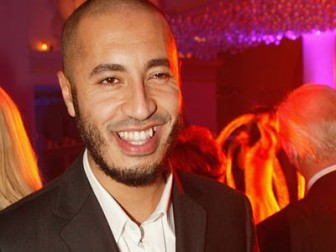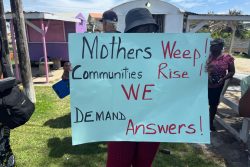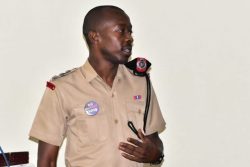TRIPOLI, (Reuters) – Libyan leader Muammar Gaddafi survived a NATO air strike on a Tripoli house that killed his youngest son and three grandchildren, a government spokesman said today.
Libyan officials took journalists to the house, which had been hit by at least three missiles. The roof had completely caved in in some areas, leaving mangled rods of reinforcing steel hanging down among chunks of concrete.
“What we have now is the law of the jungle,” government spokesman Mussa Ibrahim told a news conference. “We think now it is clear to everyone that what is happening in Libya has nothing to do with the protection of civilians.”

Gaddafi, who seized power in a 1969 coup, is fighting an uprising by rebels who have seized much of the eastern part of the country. British and French-led NATO forces are permitted under a United Nations resolution to mount air attacks on Gaddafi forces to protect civilians.
Inside one part of the villa hit late on Saturday, a beige corner sofa was virtually untouched, but debris had caved in on other striped upholstered chairs. The blasts had been heard across the city late on Saturday.
A table football machine stood outside in the garden in a wealthy residential area of Tripoli. Glass and debris covered the lawns and what appeared to be an unexploded missile lay in one corner.
There was no immediate NATO reaction, nor was any independent confirmation of the deaths possible. The appearance of an assassination attempt against Gaddafi could draw criticism.
It appeared to be the second NATO strike near to Gaddafi in 24 hours. A missile struck near the television station early on Saturday when the Libyan leader was making an address in which he said he would never step down and offered talks to rebels.
Benghazi rebels, who control a vast swathe of the east of the country, insist they cannot trust Gaddafi.
“FIGHT AND FIGHT”
Rifle fire and car horns rang out in the rebels’ eastern capital of Benghazi as news of the attack spread.
“The leader himself is in good health. He wasn’t harmed,” Ibrahim said. “His wife is also in good health.
“This was a direct operation to assassinate the leader of this country. This is not permitted by international law. It is not permitted by any moral code or principle.”
The announcement of the attack was made live on Libyan state television and Tripoli residents began to fire small arms into the air.
U.S. White House press secretary Jay Carney said the White House was aware of Libyan media reports Gaddafi’s son had been killed and was monitoring the situation.
Ibrahim said Gaddafi’s youngest son, Saif Al-Arab, had been killed in the attack. Saif al-Arab, 29, is one of Gaddafi’s less prominent sons, with a limited role in the power structure. Ibrahim described him as a student who had studied in Germany.
Gaddafi’s daughter was killed in a U.S. airstrike in 1986, ordered after a bomb attack on a West Berlin discotheque killed two U.S. servicemen. Washington linked Tripoli to the attack.
“We will fight and fight if we have to,” Ibrahim said. “The leader offered peace to NATO yesterday and NATO rejected it.”
Fighting in Libya’s civil war, which grew from protests for greater political freedom that have spread across the Arab world, has reached stalemate in recent weeks with neither side capable of achieving a decisive blow.
Libyan forces had reached the gates of Benghazi last month when Gaddafi appeared on television declaring he would crush the rebellion, showing “no pity, no mercy”. Days later the United Nations passed its resolution allowing the air strikes and saving the rebels from defeat.









